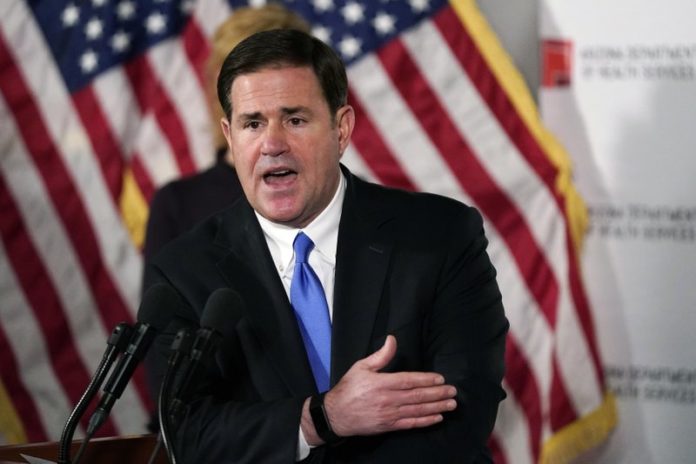
A new voter-approved tax on high-earning Arizonans that will boost education spending is firmly in Gov. Doug Ducey’s crosshairs, with the Republican vowing Friday to see Proposition 208′s new tax canceled either through the courts or the GOP-controlled Legislature.
Ducey told the Valley Partnership business group that he’s been advising people who ask him about the new 3.5% surcharge on the wealthy’s income to wait to take their investments to other states because payments on the tax now in effect won’t be due until April 2022. Meanwhile, he’s working to make the measure die, and he laid out his two-pronged strategy for doing just that.
Business groups and the GOP-led Legislature are challenging the new tax, and Ducey noted that the state Supreme Court has fast-tracked that effort by accepting the case before it can be fully heard by a trial court. Ducey filed a friend of the court brief urging the court to act, and it will be heard on April 20. Ducey has appointed a majority of the justices.
If that effort fails, Ducey said he’s working with House and Senate leaders to come up with ways to neuter the new tax, which he said will make the state’s tax code uncompetitive.
“Prop 208 promised additional dollars to K-12 education. I had no problem with that at all,” Ducey said. “But what it also did is took our top tier tax rate from 4.5% to 8%. It was a 77% increase. That I have real issues with.”
There are multiple tracks the Legislature could take, but one that eliminates about a third of the estimated $827 million a year in new revenue has already passed the Senate. That measure, by GOP Sen. J.D. Mesnard, creates a new tax code section just for small businesses, setting the top tax rate at 4.5% but avoiding the new 3.5% surcharge.
Arizona small business income is currently taxed on personal tax returns. The new tax voters approved in November imposes a 3.5% tax surcharge on income above $250,000 for individuals or above $500,000 for couples. Opponents backed by the Arizona Chamber of Commerce and Industry spent millions trying to persuade voters it would hurt small businesses.
Proponents said the tax’s effect is on owners’ income, but Mesnard argued at a February committee hearing that setting up the new small business tax is fair.
“I obviously during the campaigns heard consistently the surcharge is not aimed at small businesses, would not impact small businesses,” he told the Senate Finance Committee. “In many respects this just codifies that sentiment.”
Democratic Sen. Martin Quezada said at a full Senate debate that Mesnard’s plan was “a direct attack on the will of the voters.”
“This is another reason exactly why voters don’t trust us,” Quezada said. “They work their butts off to collect signatures, put a measure on the ballot that is going to fix a problem that we have failed to fix ourselves as legislators. They pass a proposition and we go and do something like this.”
Other paths to making the new tax less painful for the wealthy are contained in a state budget proposal now being negotiated where GOP lawmakers are considering a massive revamp of the tax code, at Ducey’s urging. His January budget proposal contains a $200 million per year tax cut that would rise to $600 million in three years. But with a budget surplus estimated to top $1 billion, Senate and House Republicans are looking way beyond that number.
Republican Rep. Ben Toma is leading efforts in the House to revamp the tax code. His proposal eliminates the current graduated tax brackets and replaces them with a flat 2.5% tax on all income levels. Under the current progressive tax structure, taxes start at 2.59% on the first $26,500 of income and rise to a maximum of 4.5% on income over $159,000.
The flat tax proposal means the wealthy would see the biggest cuts. Toma said there’s also talk of capping maximum tax with the Proposition 208 surcharge at 5% and using the general fund to make up the difference in the special fund created by the new initiative.
Half of the new tax on the wealthy will be used for raises for credentialed teachers, 25% to boosting wages for cafeteria workers, bus drivers and other support staff, and the rest for teacher training, vocational education, and other initiatives.
The initiative was an outgrowth from a 2018 teachers strike that highlighted low wages for educators and a slow rebound from budget cuts enacted during the Great Recession. The walkout secured higher wages for teachers, but many education interest groups said it fell short. A grassroots group then organized to pass the initiative.
Ducey said at Friday’s online meeting of Valley Partnership that he respects the initiative process and the will of the voters — then laid out his reasons for gutting the measure. And he said he backs more cash for K-12 schools even as he is working to eliminate the new tax.
“I think there’s a way to either fix this or in a way have the dollars available for K-12 education and keep our state competitive. One route is judicial, the other route is legislative,” he said. “And you should see resolution on this and clarity around this issue sometime in the coming months. But it will be this session.”
Republished with the permission of the Associated Press.













